By Lucy Komisar
LSD was supposed to make Aldous Huxley, Cary Grant and Clare Booth Luce burst into gorgeous new worlds, but as James Lapine imagines in this inventive, intriguing musical, it makes them more introspective, calling up pasts they cannot escape. As writer-director Lapine mixes that with their politics, I came away admiring the characters Huxley (Harry Hadden-Paton) and Grant (Tony Yazbeck), but had mixed feelings about Luce (Carmen Cusack).
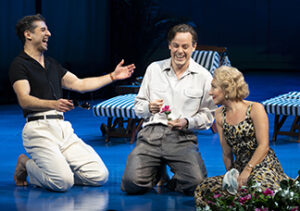
Some of the accounts are true. The three took LSD in the fifties when it was legal. Flying over sunset can mean Sunset Boulevard as well as an imagined lit up sky. However, unlike in the script, they didn’t meet up in Malibu.
They diverge mostly on political themes. Huxley is addressing the Los Angeles Board of Education to defend a teacher fired for recommending his dystopian novel, “Brave New World.” Grant declares, “There has never been a shred of evidence to prove that Mr. Chaplin is a Communist.” But Luce, about to be ambassador to Brazil, declares, “Well, Communism is a real threat in Brazil as well as many other countries in South America.” A Brazilian president who raised the minimum wage had been forced to resign by the military.
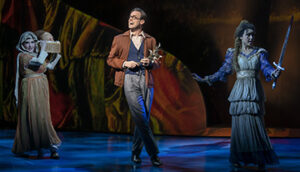
Huxley says: “Burn my book if you like, but reinstate the student’s teacher.”
Grant: “It’s time to change this terrible mind-set –”
Luce: “No, I will not amend my statement.”
LSD takes the imagination where it wants to go. For Huxley, paintings are sung. Stories come to life. He sees the biblical Judith with a bloody sword and a handmaiden carrying a basket with the decapitated head of Holofernes. Courageous Judith is compared to his wife Maria, (Laura Shoop), who we later learn has an undeclared illness.
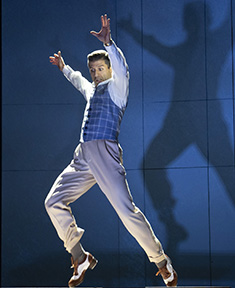
For Grant, it brings him back to his Bristol working-class roots as Archibald Leach, where at 6 he danced at music halls. “Till the funny money rolls right in” to an old music hall tune is a show stopper. Atticus Ware is terrific as the young Archie who joins Grant and his father (Nehal Joshi) in that memory tap routine.
And Yazbeck (recently in “On the Town” and “Gypsy”) of course has a very fine voice. (Music is by Tom Kitt, lyrics by Michael Korie).
But memories are also dark. Grant’s mother dressed him as girl when he was growing up, and he remembers being hungry all the time. Now, feeling that a life of being an adored actor is not real, and separated from the actress Betsy Drake, he goes to a psychiatrist.
On the other side of the class barrier is Luce. She is elegant, lounging at a pool, set off by statues in a wall covered in greenery and speaking Italian to her maid. Cusack has a good soprano. She is a very strong feminist woman. She has had a stellar career, editor of “Vanity Fair,” playwright of “The Women,” described as discussing men in often scorching language, and as a congresswoman from Connecticut. But she has sorrows. Her publisher husband Henry has a mistress, and her daughter was killed in a car crash. Her “trips” dredge up that horrific day.
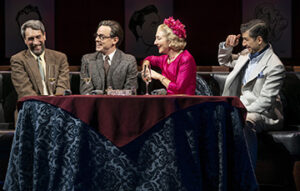
She and Huxley are dining in LA. Gerald Heard (Robert Sella), who was a guide for their acid trips, brings Grant over. Huxley says, “Thank you for defending Chaplin.” Luce suggests they take LSD together, to be fellow explorers.
The place is Luce’s Malibu estate set off by palm trees and pink hibiscus. They all relive, imagine lives of various importance to the rest of us.
Grant wants to be in a film with Sophia Loren where she plays a maid hired to look after children. It’s a romance between her and Grant’s character. And was written by his wife Drake before they split. In his imagination he asks Loren (Emily Pynenburg) to leave the producer Carlo Ponti. She says, “I don’t think so. Because you always have to lead.” They are dancing, and Loren leads. Grant: “I don’t like dancing backwards.” Loren: “I don’t either.” Quite an LSD fantasy! Great dance, great Sophia.
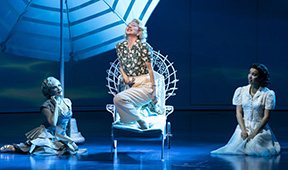
Going back to her worst memory, Luce imagines a mother and daughter, their histories and sorrows. She is still suffused with guilt. And her marriage is disintegrating. She sings, “How do you save a marriage without love, physical love? The human touch I get so little of.” A huge wave breaks.
The visuals and special effects are striking, sometimes weird, as you would expect. Set by Beowulf Boritt, projections by 59 Productions.
I somehow escaped the sixties without “dropping acid.” And I was too young to have many memories if I had. Just as well!
“Flying Over Sunset.” Book and direction by James Lapine, music by Tom Kitt, lyrics by Michael Korie, choreography by Michelle Dorrance. Vivian Beaumont Theater at Lincoln Center, 150 W 65th St., New York City. 212-239-6200. Runtime 2:40. Opened Dec. 13, 2021, closed Jan 16, 2022.

